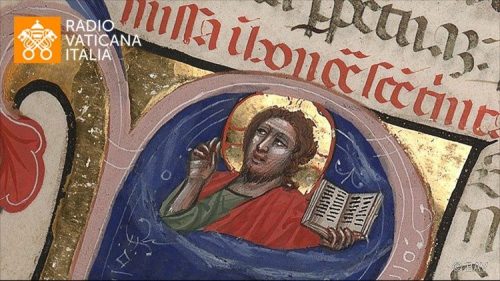READING OF THE DAY
A Reading from the Letter to the Hebrews
HEB 9:15, 24-28
Christ is mediator of a new covenant:
since a death has taken place
for deliverance from transgressions under the first covenant,
those who are called may receive the promised eternal inheritance.
For Christ did not enter into a sanctuary made by hands,
a copy of the true one, but heaven itself,
that he might now appear before God on our behalf.
Not that he might offer himself repeatedly,
as the high priest enters each year into the sanctuary
with blood that is not his own;
if that were so, he would have had to suffer repeatedly
from the foundation of the world.
But now once for all he has appeared at the end of the ages
to take away sin by his sacrifice.
Just as it is appointed that human beings die once,
and after this the judgment, so also Christ,
offered once to take away the sins of many,
will appear a second time, not to take away sin
but to bring salvation to those who eagerly await him.
GOSPEL OF THE DAY
From the Gospel according to Mark
MK 3:22-30
The scribes who had come from Jerusalem said of Jesus,
“He is possessed by Beelzebul,” and
“By the prince of demons he drives out demons.”
Summoning them, he began to speak to them in parables,
“How can Satan drive out Satan?
If a kingdom is divided against itself, that kingdom cannot stand.
And if a house is divided against itself,
that house will not be able to stand.
And if Satan has risen up against himself and is divided,
he cannot stand;
that is the end of him.
But no one can enter a strong man’s house to plunder his property
unless he first ties up the strong man.
Then he can plunder his house.
Amen, I say to you, all sins and all blasphemies
that people utter will be forgiven them.
But whoever blasphemes against the Holy Spirit
will never have forgiveness,
but is guilty of an everlasting sin.”
For they had said, “He has an unclean spirit.”
WORDS OF THE HOLY FATHER
Dear Brothers and Sisters, Good morning!
The […] Gospel reading (Mk 3:20-35) shows us two types of misunderstanding that Jesus had to face: that of the scribes and that of his own brethren.
The first misunderstanding. The scribes were men educated in the Sacred Scriptures and charged with explaining them to the people. Some of them were sent from Jerusalem to Galilee, where Jesus’ reputation was beginning to spread, in order to discredit him in the eyes of the people: to play the role of gossips, to discredit the other, to remove his authority, to do this awful thing. And they were sent to do this. And these scribes arrived with a specific and terrible accusation — they spared no means; they went straight to the point and said: “He is possessed by Beelzebul, and by the prince of demons he casts out the demons” (v. 22). That is, the prince of demons is the one who drives Him, which is more or less tantamount to saying: “He is possessed by demons”. In fact Jesus healed many sick people, and the scribes wanted to make others believe that he did so not with the Spirit of God — as Jesus did — but with that of the Evil One, with the power of the devil. Jesus reacted with firm and clear words; he did not tolerate this, because those scribes, perhaps without realizing it, were falling into the gravest sin: denying and blaspheming against God’s Love which is present and active in Jesus. And blasphemy, the sin against the Holy Spirit, is the one unforgivable sin — as Jesus said — because it comes from closing the heart to God’s mercy which acts in Jesus.
But this episode contains an admonishment which is useful to all of us. Indeed, it can happen that deep envy of a person’s goodness and good works can drive one to falsely accuse him or her. Here there is true, lethal poison: the malice with which, in a premeditated manner, one wants to destroy the good reputation of the other. May God free us from this terrible temptation! And if, by examining our conscience, we realize that this weed is sprouting within us, let us go straight away to confess it in the Sacrament of Penance, before it grows and produces its evil effects, which are incurable. Be careful, because this attitude destroys families, friendships, communities and even society.
Today’s Gospel also speaks to us about another, very different misunderstanding with regard to Jesus: that of his brethren. They were worried, because his new itinerant life seemed folly to them (cf. v. 21). In fact, he exhibited such openness toward the people, especially toward the sick and toward sinners, to the extent that he did not even have time to eat. Jesus was like that: people first; serving people; helping people; teaching people; healing people. He was for the people. He did not even have time to eat. Thus, his brethren decided to take him back home to Nazareth. His brethren came to the place were Jesus was teaching and they sent to him and called him. He was told: “‘Your mother and your brethren are outside, asking for you.’ And he replied: ‘Who are my mother and my brethren?’. And looking around on those who sat about him, he said ‘Here are my mother and my brethren! Whoever does the will of God is my brother, and sister, and mother’” (vv. 32-35).
Jesus formed a new family, no longer based on natural ties, but on faith in him, on his love which welcomes us and unites us to each other, in the Holy Spirit. All those who welcome Jesus’ word are children of God and brothers and sisters among themselves. Welcoming the word of Jesus makes us brothers and sisters, makes us Jesus’ family. Speaking ill of others, destroying others’ reputations, makes us the devil’s family.
Jesus’ response was not a lack of respect for his mother and his brethren. Rather, for Mary it is the greatest recognition, precisely because she herself is the perfect disciple who completely obeyed God’s will. May the Virgin Mother help us to live always in communion with Jesus, recognizing the work of the Holy Spirit who acts in him and in the Church, regenerating the world to new life.
(Angelus, 10 June 2018)

